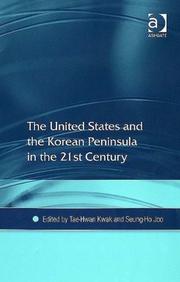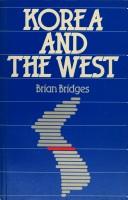| Listing 1 - 10 of 22 | << page >> |
Sort by
|
Book
Year: 1990 Publisher: Seoul : Research Center for Peace and Unification of Korea,
Abstract | Keywords | Export | Availability | Bookmark
 Loading...
Loading...Choose an application
- Reference Manager
- EndNote
- RefWorks (Direct export to RefWorks)
Book
ISBN: 9781138647459 9781315627014 9781317236740 9781138647503 Year: 2018 Publisher: Abingdon, Oxon ;New York, NY Routledge
Abstract | Keywords | Export | Availability | Bookmark
 Loading...
Loading...Choose an application
- Reference Manager
- EndNote
- RefWorks (Direct export to RefWorks)
Giving equal weight to North and South Korea, this book traces the history of political and economic development and international relations of the Korean Peninsula, showing how South Korea became democratized and how Juche ideology has affected the establishment and operation of a totalitarian system in North Korea. Written in a straightforward, jargon-free manner, this textbook utilizes both historical-institutional approaches and quantitative evidence to analyze the political dimensions of a wide variety of issues including : legacies of Japanese colonial rule (1910-1945) and the Korean War (1950-1953); South Korean democratization and democratic consolidation; South Korean diplomacy and North Korean nuclear crises; the economic development of both North and South Korea; the three-generation power succession in North Korea; North Korean human rights issues; inter-Korean relations and reunification.
KOREA (SOUTH)--POLITICS AND GOVERNMENT --- KOREA (SOUTH)--FOREIGN RELATIONS --- KOREA (SOUTH)--ECONOMIC CONDITIONS --- KOREA (NORTH)--POLITICS AND GOVERNMENT --- KOREA (NORTH)--ECONOMIC CONDITIONS --- KOREA (SOUTH)--FOREIGN RELATIONS--KOREA (NORTH) --- KOREA (NORTH)--FOREIGN RELATIONS--KOREA (SOUTH)
Book
ISBN: 0231058829 9780231058827 Year: 1985 Publisher: New York (N.Y.): Columbia university press,
Abstract | Keywords | Export | Availability | Bookmark
 Loading...
Loading...Choose an application
- Reference Manager
- EndNote
- RefWorks (Direct export to RefWorks)
Corée --- Politique extérieure --- --1742 --- Korea (South) --- Foreign relations --- -Foreign relations --- --Politique extérieure --- --Korea (South) --- Korea (South) - Foreign relations

ISBN: 0754648133 Year: 2006 Publisher: Aldershot, UK : Ashgate,
Abstract | Keywords | Export | Availability | Bookmark
 Loading...
Loading...Choose an application
- Reference Manager
- EndNote
- RefWorks (Direct export to RefWorks)
Book
ISBN: 9780745331621 Year: 2011 Publisher: London : Pluto Press,
Abstract | Keywords | Export | Availability | Bookmark
 Loading...
Loading...Choose an application
- Reference Manager
- EndNote
- RefWorks (Direct export to RefWorks)
KOREA (NORTH)--FOREIGN RELATIONS--KOREA (SOUTH) --- KOREA (SOUTH)--FOREIGN RELATIONS--KOREA (NORTH) --- USA--FOREIGN RELATIONS--KOREA (SOUTH) --- USA--FOREIGN RELATIONS--KOREA (NORTH) --- KOREA (SOUTH)--FOREIGN RELATIONS--USA --- KOREA (NORTH)--FOREIGN RELATIONS--USA --- CHINA--FOREIGN RELATIONS--KOREA (NORTH) --- CHINA--FOREIGN RELATIONS--KOREA (SOUTH) --- KOREA (SOUTH)--FOREIGN RELATIONS--CHINA --- KOREA (NORTH)--FOREIGN RELATIONS--CHINA

ISBN: 0710211104 Year: 1986 Publisher: London : Routledge & Kegan,
Abstract | Keywords | Export | Availability | Bookmark
 Loading...
Loading...Choose an application
- Reference Manager
- EndNote
- RefWorks (Direct export to RefWorks)
Book
ISBN: 9781000414066 100041406X 9781003148890 1003148891 9781000414110 1000414116 9780367700492 0367700492 9780367710002 0367710005 Year: 2021 Publisher: New York, New York ; London : Routledge,
Abstract | Keywords | Export | Availability | Bookmark
 Loading...
Loading...Choose an application
- Reference Manager
- EndNote
- RefWorks (Direct export to RefWorks)
This book considers both Koreas - North Korea and South Korea - to examine possible pathways for the years leading up to 2032 and beyond, thus offering a composite picture of Korea and its strategic relevance in Asia and the world at large. With the announcement of the two Koreas seeking a joint Olympic bid for 2032, this book takes the opportunity to revisit the history of the Koreas in a comparative contemporary context. This book does so by treating both Koreas as closely connected - rather than divided - in order to better understand and forecast their relevance and rise in both an Asian and global context. Chapters begin with a brief historical review and analysis of the present, before moving to consider how these will shape the next decade, drawing comparative and complementary analyses. No matter how contrasting the contemporary trajectories of both North and South Korea might appear, 'Korea' as a singular entity is an old concept still containing great possibilities. As the ongoing inter-Korean reconciliation process underscores, the futures of North and South Korea can be found in a complementary singular Korea, which would again represent an important political, strategic, cultural, and social space in Asia.
Book
ISBN: 0030534666 9780030534669 Year: 1982 Volume: *32 *3 Publisher: New York: Praeger,
Abstract | Keywords | Export | Availability | Bookmark
 Loading...
Loading...Choose an application
- Reference Manager
- EndNote
- RefWorks (Direct export to RefWorks)
Book
ISBN: 9781107104679 9781316221792 9781107507135 Year: 2018 Publisher: Cambridge Cambridge University Press
Abstract | Keywords | Export | Availability | Bookmark
 Loading...
Loading...Choose an application
- Reference Manager
- EndNote
- RefWorks (Direct export to RefWorks)
In contrast to previous studies of the South Korea-U.S. alliance, the authors analyze the bigger picture, including the history, economics, security, alliance structure, politics, and the future of the alliance. Taking alliance theory as a starting point, the authors argue that the alliance provides an ideal case study to examine how the political development and economic growth of junior partners impact an alliance. As South Korea's capabilities and ambitions have grown, the alliance has evolved from an asymmetric regional security relationship to an economic partnership with global interests, while China's rise and North Korea's nuclear development mean that South Korea remains of strategic importance for American interests in East Asia.
Book
ISBN: 9781588268051 1588268055 1626375186 Year: 2012 Publisher: Boulder (Colo.): Lynne Rienner,
Abstract | Keywords | Export | Availability | Bookmark
 Loading...
Loading...Choose an application
- Reference Manager
- EndNote
- RefWorks (Direct export to RefWorks)
How can the United States and South Korea best cooperate to address new security challenges? Can the US-ROK alliance serve to advance South Korea's interests and at the same time help the US to more effectively pursue its own global and regional security objectives? In the context of these questions, the authors explore the possibilities for enhanced cooperation in both traditional and nontraditional spheres. The chapters, all organized around a common set of questions, address issues ranging from counterterrorism, military affairs, and nuclear nonproliferation, to the environment, pandemics, and biological threats, to peacebuilding, development assistance, and humanitarian aid. In each chapter, the authors consider the capacities and potential for cooperation on both sides, assess the corresponding challenges, and propose new forms of collaboration.
National interest --- United States --- Korea (South) --- Foreign relations --- Interest, National --- International relations --- Nation-state --- National interest - United States --- National interest - Korea (South) --- United States - Foreign relations - Korea (South) --- Korea (South) - Foreign relations - United States
| Listing 1 - 10 of 22 | << page >> |
Sort by
|

 Search
Search Feedback
Feedback About UniCat
About UniCat  Help
Help News
News